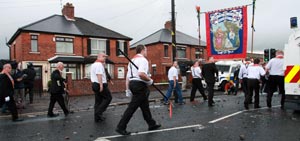23 July 2009 Edition
Orange Order rejects dialogue with Sinn Féin on parades

DIALOGUE: In the interest of the public and the Orange Order
BY LAURA FRIEL
ORANGE ORDER Grand Secretary Drew Nelson stood in front of the camera and demanded an apology, but what he was really offering was little more than a lame excuse. Nelson was responding to an offer by Sinn Féin President Gerry Adams of dialogue as a means to resolve the outstanding matter of contentious Orange parades.
Republicans would have to apologise for “the IRA murder of the 275 Orangemen murdered during the Troubles” before he could even contemplate any dialogue with Sinn Féin, Nelson told the media.
For nationalists, it was a curious statement; for republicans disingenuous in its implication. No one would dispute that members of the Orange Order died as a result of the conflict but it wasn’t because they were Orangemen – it was because they were combatants, either as members of the RUC or unionist paramilitaries like the UDA and UVF.
Indeed, one of the reasons Orange Order parades remain unwelcome in nationalist areas is because of their long and well-documented association with sectarian, anti-Catholic violence, either in the form of Orange mobs attacking Catholic areas (usually but not exclusively during the marching season) as well as their blatant association with unionist paramilitaries. Why else are Orange parades often accompanied by paramilitary bands and banners?
Of course, we’ve mostly moved away from the most blatant displays of sectarian hatred formerly indulged by Orange Order marchers, such as the notorious five-fingered salute given by Orangemen parading past the Ormeau Road bookies just weeks after loyalist paramilitaries had murdered five Catholics in a sectarian machine gun attack.
Or the time those accompanying an Orange march in Portadown re-enacted the sectarian murder of Robert Hamill by miming jumping up and down on someone’s head as they passed the nationalist Garvaghy Road estate.
Or after the appalling murder of the Quinn children in Ballymoney in the early hours of the Twelfth in 1998, the reaction to a suggestion by one of their own Orange Order chaplains that “no road is worth a life let alone three lives of three little boys” – Reverend William Bingham was unceremoniously thrown into a ditch.
And attempts by the loyal orders to reinvent the Twelfth as a community festival, an ‘Orangefest’, has also been seen by some as an attempt at reform, a move away from ‘Kick-the-Pope’ bands and alcohol-fuelled sectarian hostility, the usual corollary of Orange parades.
Of course, the more cynical cite the fact that many of the changes undertaken by the Order have been in response to the imposition of parading restrictions and the opportunity of acquiring funding.
In a study of the recent meltdown within financial institutions, Gillian Tett, a former anthropologist and Financial Times journalist, describes “social silences” which often underpin acceptance of half-truths as truth or fantasy as fact. Tett is only concerned with the myths that underpinned the money market crisis but social silences are ideological constructs which apply to so much more.
NOT WANTED
The Orange Order has a few “social silences” upon which it perpetuates its image and justifies its position. The most blatant is that it is not a sectarian organisation. To maintain this, the Order must deny its roots, silence its history and obscure the role it has played during the last 30 years of conflict.
Another “silence” is the fact that, out of over 3,000 Orange parades, only half a dozen are contentious and subject to re routing.
Another myth, uncontested by “silence” and often used as a justification by Orangemen to march where and when they please with no reference to the local residents, is the notion that Orange parades “uphold civil and religious liberty”.
But the Orange Order has never been about protecting universal rights of religious freedom. It has not been a story of accepting difference and promoting toleration. Equality and human rights legislation “upholds civil and religious liberty”, not a determination by Orangemen to parade where they’re not wanted.
But organisations can evolve and change and if the Orange Order is willing to evolve into what it is already claiming to be, a mechanism to promote and celebrate Protestantism and a particular cultural history, not as oppositional but as complementary additions to the rich tapestry of our shared history, then it would be a welcome development.
LEADERSHIP RESPONSIBILITIES
Responding to Orange Order Grand Secretary Drew Nelson’s rejection of Sinn Féin’s offer of dialogue, Gerry Adams suggested Nelson was putting his personal feelings before his leadership responsibilities.
“I listened to Drew Nelson’s interview and it is clear he is allowing his personal feelings to undermine his leadership responsibilities and obligations. Republicans could put up exactly the same preconditions but we very consciously refrain from doing so,” said Adams.
“All the deaths and the bereavement of families from all sides should be a matter of regret for everyone, republican and Orangemen alike. A commitment to prevent such deaths should also be the responsibility of republicans and Orangemen.
“Upholding the primacy of dialogue and engaging with each other in the public interest and the common good is part of this. Dialogue is a necessary part of any human discourse. It is especially so in a conflict resolution process. It is also in the interests of the Orange Order.
“The Orange Order leadership’s refusal to talk makes a nonsense of their other initiatives like Orangefest,” Adams concluded.
UNWELCOME: Paramilitary bands and banner on marches in nationalist areas




